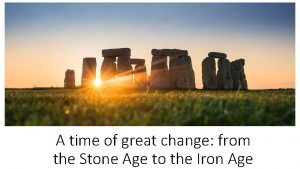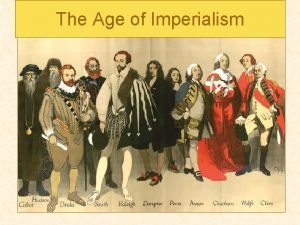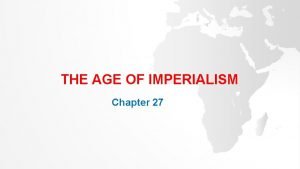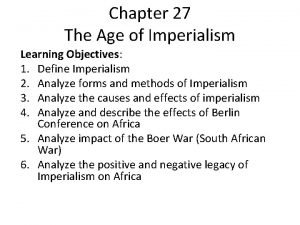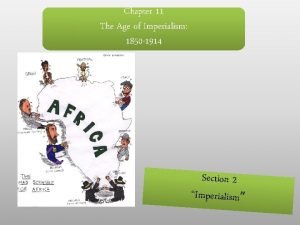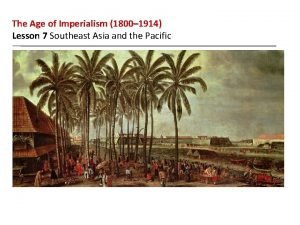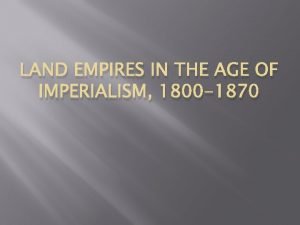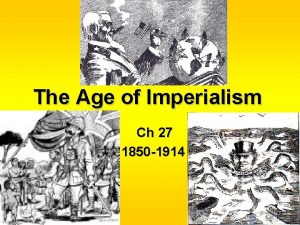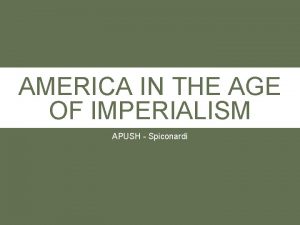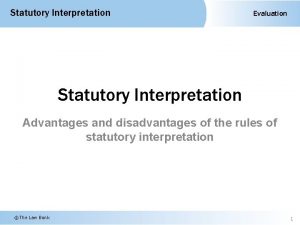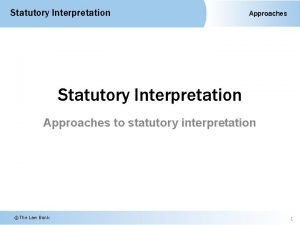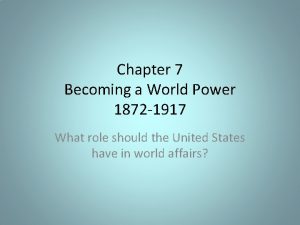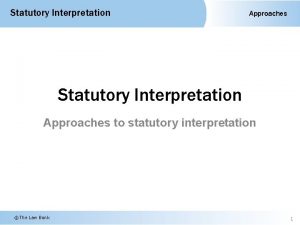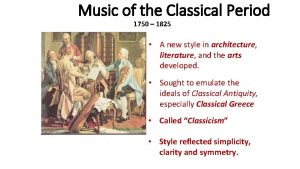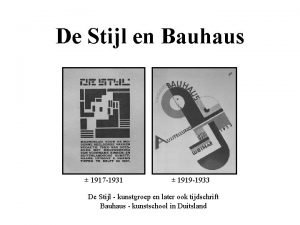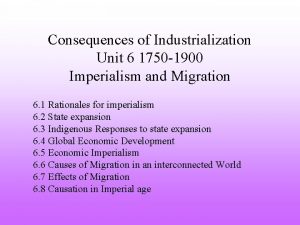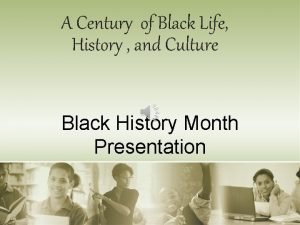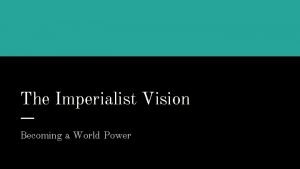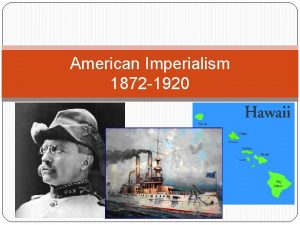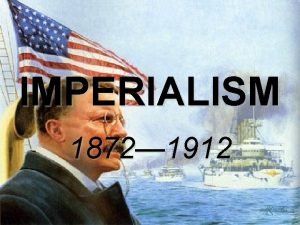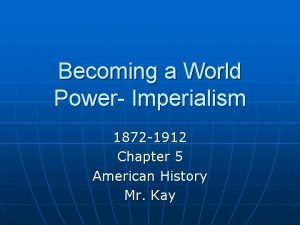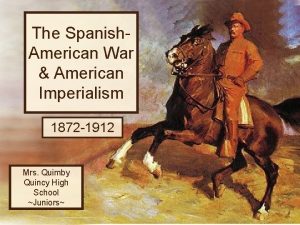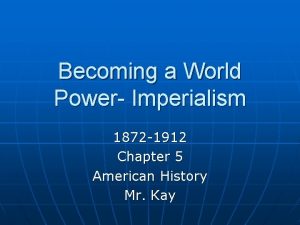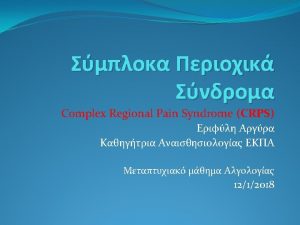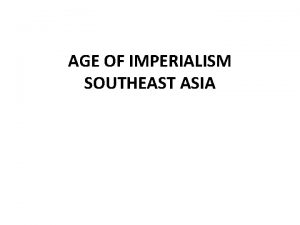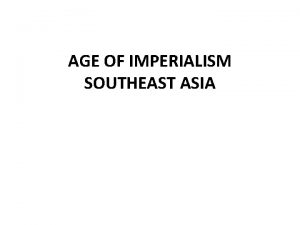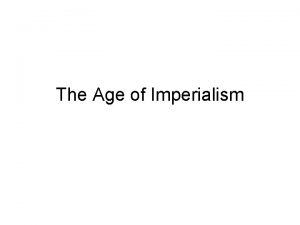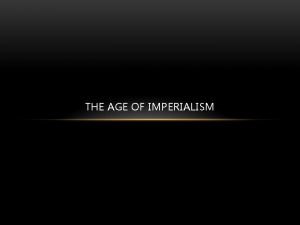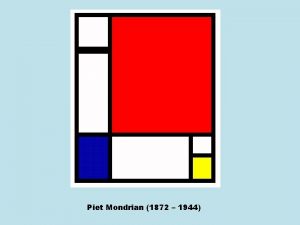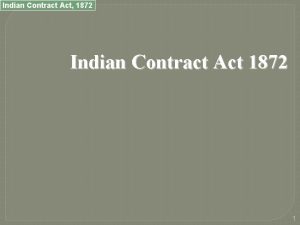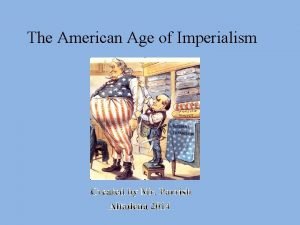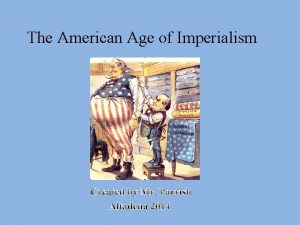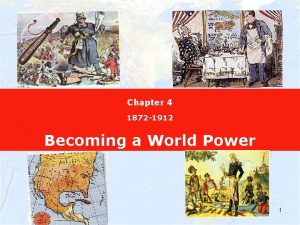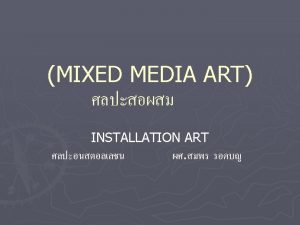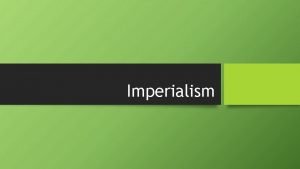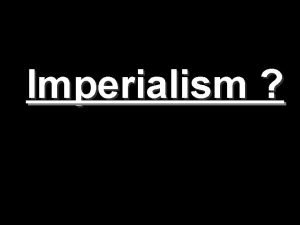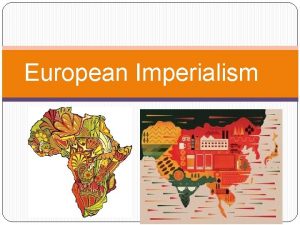Age of Imperialism 1872 1912 Why does this
























- Slides: 24

Age of Imperialism 1872 -1912

Why does this matter? n During this era, economic and military competition from world powers convinced the United States that it must become a world power. The United States became an empire when it acquired the Philippines and territory in the Caribbean. American influence in Central and South America grew as the US took a more active role in Latin American affairs.

Section 1: The Imperialist Vision n In the years following the Civil War, most Americans were not interested in expanding territory past the ocean, but in the late 1800’s, opinions began to shift. Most people wanted the US to become a world power. Economic and military competition, as well as a feeling of cultural superiority led to this shift.

Vocabulary n n Imperialism: is the economic and political domination of a strong nation over a weaker nation. Protectorate: the imperial power allowed local rulers to stay in control and under protection as long as they took the advice of the imperial power.

In Europe: n n n By the late 1800’s, most European countries had industrialized and were placing high tariffs against each other. There was also a sudden shortage of natural resources since most of Europe had been industrialized. Countries began looking overseas to invest including Africa and Asia.

Colonial Africa

In the United States… n As the US industrialized, many Americans took a new interest in imperialism. Until the late 1800’s, American expansion had been west to the Pacific, but with the west filling up, many decided that the nation had to develop overseas markets to remain strong.

Social Darwinism n n Many Social Darwinists believed that nations competed with each other politically, economically, and militarily and that only the strongest will survive. Historians like John Fiske took this one step farther and argued that English speaking nations had superior character, ideas, and systems of government and were destined to rule the planet. This idea was called Anglo-Saxonism and was popular because it went along with the idea of Manifest Destiny.

Expansion in the Pacific n n Even before the era of imperialism, Americans had already begun expand across the Pacific. Many American business leaders thought of Japan and their rulers, China, would be good for trade, but China and Japan were very worried about the western influence on their culture and only allowed other Chinese or Dutch to trade with them.

Expansion in the Pacific con’t n n n After receiving several petitions from Congress, President Pierce decided to force Japan to trade with the US. He ordered Commodore Matthew C. Perry to take a naval expedition to Japan to negotiate a trade treaty. On July 8, 1853, 4 American warships entered what is now called Tokyo Bay. Perry’s arrival impressed the Japanese and forced the Japanese to realize that they could not compete and they agreed to sign the treaty.

Matthew C. Perry

China and Japan

Hawaii n n n As trade with China grew, people began looking at Hawaii…why? Americans began settling in Hawaii and found the soil to be very fertile for growing sugarcane and established many sugar plantations In 1872, a severe recession hit, and in order to protect their economic status, the settlers asked for tariffs to be reduced. Congress agreed.

Hawaii n n The treaty also allowed the US to set up a base on the island (_____) Tensions began to increase between settlers and the monarchy in Hawaii. Mc. Kinley Tariff- subsidies for sugar planters and no tariffs, but still Hawaii’s economy suffers. Then, in 1891 Queen Liliuokalani came to the throne

Queen Liliuokalani

n n The Queen tried to pass a law giving control of the government back to her. Supported by Marines, a group of planters forced the Queen to give up power and set up a provisional government until they could be annexed to the US Pres. Cleveland opposed imperialism and disagreed with the planters. They decided to wait until Cleveland was out of office, and eventually were annexed in 1897.

Trade and Diplomacy in Latin America n n Although the US bought most of its raw materials from Latin America, Latin America bought most of its goods from Europe. Americans wanted 2 things • Increase business dealings with Latin America • Show Europe that the US was the dominant power in the region.

Pan-Americanism n n n James G. Blaine was the Secretary of State who came up with the idea of Pan-Americanism. It was the idea that the US and Latin America should work together. Eventually created the Pan American Union and the Organization of American States.

Steps to being assertive in foreign affairs n Step 1 • Decide you want to be assertive n Step 2 • Have a Captain (Alfred Mahan) write a book proving the strength of a modern navy n Step 3 • Have a senator (Henry Cabot Lodge) and future president (Teddy Roosevelt) agree n Step 4 • Have Congress agree and give funding for the beginning of a modern navy

Spanish American War n n In February 1898, The USS Maine exploded off the coast of Havana. The Spanish were blamed. Before this there was an uprising in Cuba, where the Americans supported the Cuban rebels against the Spanish because of the stories of Spanish atrocities (bad things they did) from major newspapers. This kind of sensationalist reporting became known as yellow journalism.

Cont’d n n Because of all the attention, the US decided to send the USS Maine into Havana in case Americans there needed to be evacuated. Soon after it exploded. A Commission decided Spain was to blame and America went to war.

USS Maine

The War on Two Fronts n n The US took the Philippines at Manila Bay, led by George Dewey. On the way to the Philippines, the Americans also took Guam another Spanish territory in the Pacific. In Cuba, American troops arrived including a group of people known as the Rough Riders, a mix of cowboys, miners, and law officers. Commander of the Rough Riders was Leonard Wood. 2 nd in command was Theodore Roosevelt. . This group ended up assisting in the capture of San Juan.

Treaty of Paris n n December 10, 1898: the Treaty of Paris ends the war. Cuba became an independent country. US acquired Puerto Rico and Guam and paid $20 million for the Philippines. The US is now officially a world power.
 Stone age, bronze age iron age timeline
Stone age, bronze age iron age timeline Iron age bronze age stone age timeline
Iron age bronze age stone age timeline Hey hey bye bye
Hey hey bye bye Africa 1890
Africa 1890 Old vs new imperialism
Old vs new imperialism Age of imperialism
Age of imperialism Chapter 27 building vocabulary the age of imperialism
Chapter 27 building vocabulary the age of imperialism Chapter 27 building vocabulary the age of imperialism
Chapter 27 building vocabulary the age of imperialism Chapter 11 the age of imperialism
Chapter 11 the age of imperialism Contrast siam’s fate to that of burma and vietnam.
Contrast siam’s fate to that of burma and vietnam. Land empires in the age of imperialism
Land empires in the age of imperialism Chapter 27 the age of imperialism
Chapter 27 the age of imperialism Seward's icebox apush
Seward's icebox apush Whitely v chappel
Whitely v chappel London and north eastern railway v berriman
London and north eastern railway v berriman R v allen (1872) lr 1 ccr 367
R v allen (1872) lr 1 ccr 367 Becoming a world power 1872-1917 answers
Becoming a world power 1872-1917 answers R v allen (1872) lr 1 ccr 367
R v allen (1872) lr 1 ccr 367 What period lasted from 1750-1825?
What period lasted from 1750-1825? Kenmerken bauhaus
Kenmerken bauhaus Open shaft diamond mining at kimberley south africa in 1872
Open shaft diamond mining at kimberley south africa in 1872 Lunch pail inventor
Lunch pail inventor The imperialist vision
The imperialist vision Who were the members of the propaganda movement?
Who were the members of the propaganda movement? Claude monet impresia
Claude monet impresia

